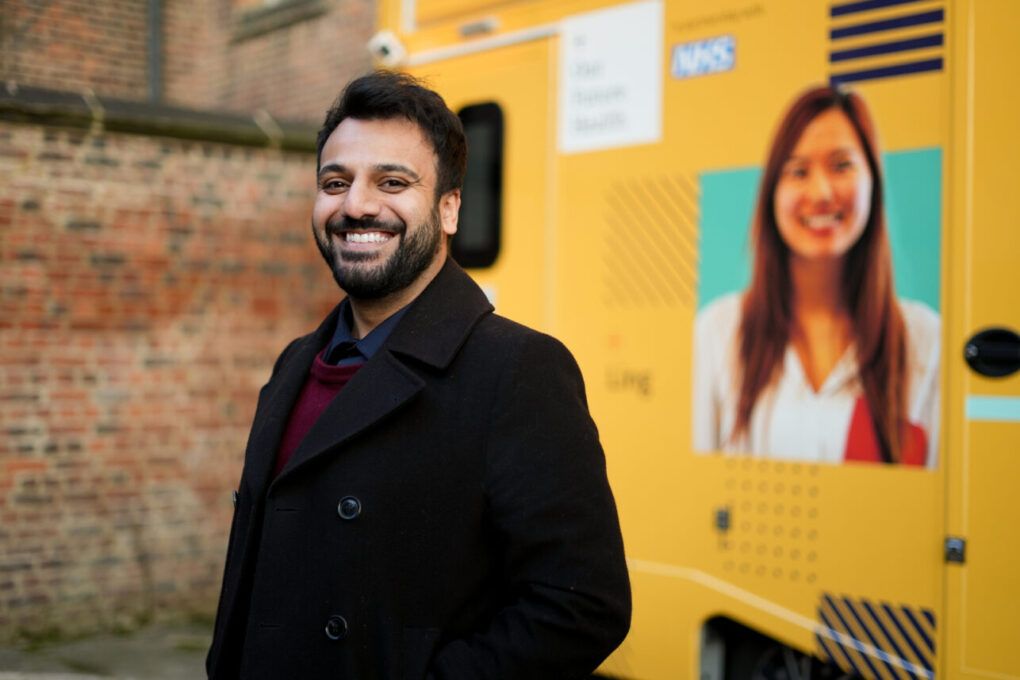How our Manchester clinic is helping underrepresented communities join the UK’s largest health research programme

It’s a bright and frosty morning in Manchester, and an Our Future Health clinic is ready to welcome its latest wave of volunteers.
The scene is one that’s repeated around the country every day – although here, there’s a crucial difference. The van is being hosted by the British Muslim Heritage Centre, in an effort to help underrepresented communities take part in the UK’s largest health research programme.
Representation has long been a problem in health research. In the past, many studies have been based on only a proportion of the population. It helps to explain why some healthcare works better for some people than others.
Our Future Health is committed to improving the situation. By building a resource that truly reflects the UK population, we can help researchers to identify differences in how diseases begin and progress in people from different backgrounds.
That’s why we’ve started a project to bring our mobile clinics to the heart of new communities. The idea is to make signing up as easy as possible.
“We’ve been promoting Our Future Health in sermons and online,” says British Muslim Heritage Centre Imam Shafiq Siddiq. “This has helped to encourage them to attend their appointments. This is key for communities who haven’t historically been included in health research.”
Making an impact, for generations to come

Maths teacher Kamran Khalid was among the first volunteers to attend his appointment at the British Muslim Heritage Centre.
“I heard about the mobile clinic during Friday prayer,” says the 33-year-old. “As soon as the Imam mentioned it, I wanted to see what I could do to help myself and others by signing up.
Kamran says he was surprised to learn that South Asians are underrepresented in current health research. “That’s why volunteering felt like the right thing to do. The more data we have, the more beneficial future breakthroughs will be for us all.”

Like Kamran, Farah Ilyas, 56, signed up immediately when she heard about Our Future Health.
“If the research that comes about as a result of Our Future Health helps others, that’s always going to be a good thing,” Farah adds. “We need health research to keep it moving forward and continue medical learnings about people from all backgrounds.
“Having my cholesterol levels and blood pressure checked has given me peace of mind. At my age it’s important to keep a close eye on any changes that might be happening inside your body that you may not be aware of,” she says.
A medic’s view

73-year-old Mohammed Khan also volunteered at our British Muslim Heritage Centre clinic. He says that his career drove him to want to take part.
“I’ve worked as a medic in the NHS for the last 35 years – I know the importance of health research,” says Mohammed. “It has so much power to improve treatments for many chronic diseases.
“In the Asian community heart disease and diabetes is prevalent,” he says. “We all know we should exercise and pay attention to what we eat, but there are still other factors that need to be better understood.”
“Diversity in research is vital, as every community has different lifestyles, different genetics. We need to understand more about these differences and how they relate to disease.
‘Manchester is extremely proud to play its part’

Local councillors Naeem Ul-Hassan and Thomas Robinson also attended appointments. Both noted how clinic at the British Muslim Heritage Centre made it convenient for residents in ethnically diverse postcodes to participate.
“This project could help change the way we deliver healthcare all over the country,” says Councillor Robinson. “Manchester is extremely proud to play its part in the beginnings of these efforts.”

“We know that poor health outcomes disproportionately affect residents of ethnic minority backgrounds, and this can’t continue,” he adds. “Our Future Health is a part of how we tackle that. We need initiatives such as this to shed further light on the health of our communities.
“My appointment was wonderfully easy to attend, the staff are lovely. Plus, you’re told your blood pressure and cholesterol readings instantly. If Our Future Health is in your area, make sure you sign up fast!”
‘Your chance to be part of something bigger than you’

Our Future Health community engagement manager Asya Choudry, who worked with the British Muslim Heritage Centre to establish the clinic in Manchester, says she is heartened by the positive response from the local community.
“Many medicines are currently developed based on data from white British people,” she says. “I’m British Pakistani, so when it comes to diverse communities like mine, the medicines don’t always have the same efficacy.
“Isn’t it important that we have treatments tailored to help us, too? That’s only going to happen if we take part in research like this. We all need to step forward so everyone can benefit.
“We’ll be running more clinics like this one in the New Year, at locations like the Curry Mile. Signing up is quick and easy – so why not be part of something bigger than yourself and make an impact for generations to come?”

Let’s prevent disease together
By volunteering for Our Future Health, you can help health researchers discover new ways to prevent, detect and treat common conditions such as diabetes, cancer, heart disease, stroke and Alzheimer’s.